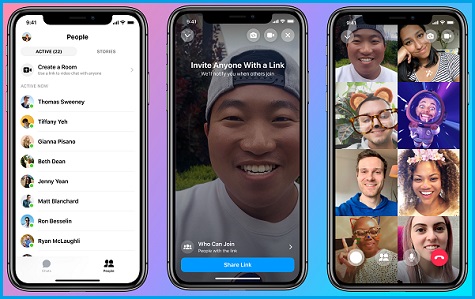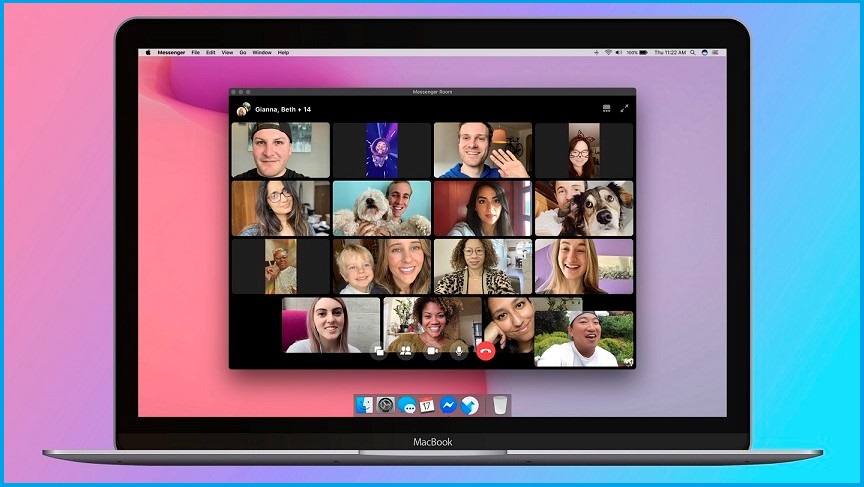Facebook is taking on the likes of Zoom and Houseparty with the launch of a new real-time video chat feature, as the social media giant looks to cash in on the rapid growth in video-based socialising.
Amid the ongoing COVID-19 pandemic, a number of video-based platforms have seen an explosion in growth as people around the world turn to technology not just for work, but for social activities too.
Zoom has seen its daily active users rise to 300 million in April, while Houseparty, a social live-video app built by Fortnite creators Epic Games, was downloaded more than 2 million times at the start of March.
Now Facebook has expanded its suite of video services in an effort to take on these rivals and keep pace with the use of real-time video for social activities.
The company has launched Messenger Rooms, where a host can invite anyone to participate or leave open for anyone to join, very similarly to how Houseparty works.
Each Messenger Room will be able to hold up to 50 people and there will be no time limit on the video chats. Anyone can participate, even if they don’t have a Facebook account, and the room host will have a high-level of control over who can join.
“Host celebrations, gather a book club or just hang out on the couch with friends,” a Facebook blog post said. “You don’t need to call someone and hope it’s a good time or check everyone’s calendar first.”
Open rooms that you can join will soon appear on Facebook, while you can also receive invitations and join via your phone or computer. Rooms will initially be created from Messenger or Facebook but will soon be available through Instagram Direct, WhatsApp and Portal.
Facebook began rolling out the new feature last week and will expand it around the world “in the coming weeks”.

The feature is a direct competitor to Zoom and Houseparty’s offerings, which have been used widely around the world in recent months for virtual social gatherings of multiple people at once.
Zoom particularly has been the subject of intense scrutiny and criticism over its privacy and data security practices, and is in the midst of a 90-day action plan to address many of these issues.
With the launch of Messenger Rooms, Facebook has attempted to spin the service as a privacy-protecting option for virtual socialising.
In a blog post, Facebook chief privacy officer Erin Egan said the product had been built with privacy front of mind, and with strong controls for each host.
“The person who creates the room controls the settings for who can join, how easy a room is to find and whether to enable or share a link,” Egan said. “The default privacy settings were designed to be consistent with what you’d expect for where you create a room.”
This has been a central criticism of Zoom, which has seen numerous incidents of “zoombombing”, with unknown trolls joining random Zoom calls and often sharing explicit content.
With Facebook’s Rooms, hosts will have the power to make the room locked or unlocked, and will be able to remove unwanted participants.
Room guests will be able to leave the room whenever they want, even if it is locked by the host.
If you aren’t a Facebook user and join a room, the company will collect information on your device and browser type, product usage information and other technical information.
This is done to provide the service and improve the product experience, Egan said.
Facebook is also working with outside vendors to review any potential security issues with the feature.
“We also worked with our security team to make Rooms links difficult for hackers to guess,” Egan said.
“Our room links have a string of random characters and digits at the end, with numbers and letters in different cases. This makes it challenging for hackers to guess the exact combination of characters, and a new link is generated every time you create a room.”
In contrast to Facebook’s WhatsApp service, Rooms will not initially utilise end-to-end encryption, but the company is working on implementing this later.
“Room is built on Messenger, so it uses the same technology to encrypt video and audio conversations between people as it travels from their devices to our servers that we have placed in only a handful countries that have strong rules of law,” Egan said.
“Rooms is not end-to-end encrypted. While there are significant challenges to providing end-to-end encryption for video calling with large groups of people, we’re actively working towards this for Messenger and Rooms.”










